Jingsen Zhang
HAPS: Hierarchical LLM Routing with Joint Architecture and Parameter Search
Jan 09, 2026Abstract:Large language model (LLM) routing aims to exploit the specialized strengths of different LLMs for diverse tasks. However, existing approaches typically focus on selecting LLM architectures while overlooking parameter settings, which are critical for task performance. In this paper, we introduce HAPS, a hierarchical LLM routing framework that jointly searches over model architectures and parameters. Specifically, we use a high-level router to select among candidate LLM architectures, and then search for the optimal parameters for the selected architectures based on a low-level router. We design a parameter generation network to share parameters between the two routers to mutually enhance their capabilities. In the training process, we design a reward-augmented objective to effectively optimize our framework. Experiments on two commonly used benchmarks show that HAPS consistently outperforms strong routing baselines. We have released our code at https://github.com/zihangtian/HAPS.
Expectation Confirmation Preference Optimization for Multi-Turn Conversational Recommendation Agent
Jun 17, 2025Abstract:Recent advancements in Large Language Models (LLMs) have significantly propelled the development of Conversational Recommendation Agents (CRAs). However, these agents often generate short-sighted responses that fail to sustain user guidance and meet expectations. Although preference optimization has proven effective in aligning LLMs with user expectations, it remains costly and performs poorly in multi-turn dialogue. To address this challenge, we introduce a novel multi-turn preference optimization (MTPO) paradigm ECPO, which leverages Expectation Confirmation Theory to explicitly model the evolution of user satisfaction throughout multi-turn dialogues, uncovering the underlying causes of dissatisfaction. These causes can be utilized to support targeted optimization of unsatisfactory responses, thereby achieving turn-level preference optimization. ECPO ingeniously eliminates the significant sampling overhead of existing MTPO methods while ensuring the optimization process drives meaningful improvements. To support ECPO, we introduce an LLM-based user simulator, AILO, to simulate user feedback and perform expectation confirmation during conversational recommendations. Experimental results show that ECPO significantly enhances CRA's interaction capabilities, delivering notable improvements in both efficiency and effectiveness over existing MTPO methods.
HF4Rec: Human-Like Feedback-Driven Optimization Framework for Explainable Recommendation
Apr 19, 2025
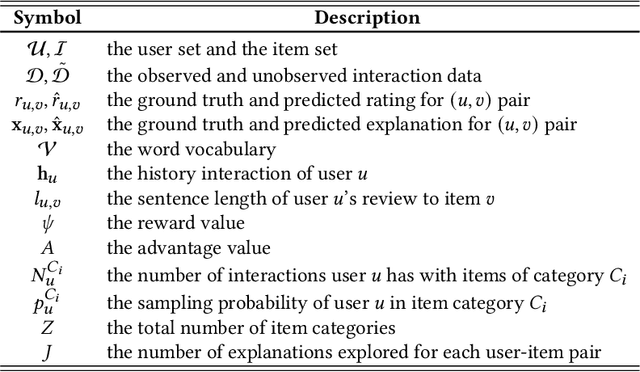

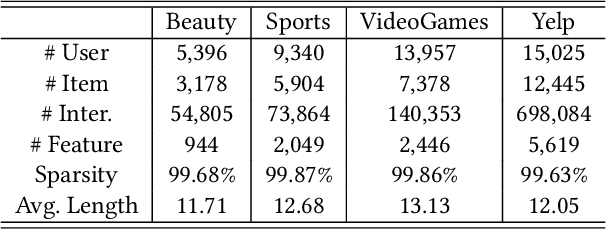
Abstract:Recent advancements in explainable recommendation have greatly bolstered user experience by elucidating the decision-making rationale. However, the existing methods actually fail to provide effective feedback signals for potentially better or worse generated explanations due to their reliance on traditional supervised learning paradigms in sparse interaction data. To address these issues, we propose a novel human-like feedback-driven optimization framework. This framework employs a dynamic interactive optimization mechanism for achieving human-centered explainable requirements without incurring high labor costs. Specifically, we propose to utilize large language models (LLMs) as human simulators to predict human-like feedback for guiding the learning process. To enable the LLMs to deeply understand the task essence and meet user's diverse personalized requirements, we introduce a human-induced customized reward scoring method, which helps stimulate the language understanding and logical reasoning capabilities of LLMs. Furthermore, considering the potential conflicts between different perspectives of explanation quality, we introduce a principled Pareto optimization that transforms the multi-perspective quality enhancement task into a multi-objective optimization problem for improving explanation performance. At last, to achieve efficient model training, we design an off-policy optimization pipeline. By incorporating a replay buffer and addressing the data distribution biases, we can effectively improve data utilization and enhance model generality. Extensive experiments on four datasets demonstrate the superiority of our approach.
Enhancing Recommendation Explanations through User-Centric Refinement
Feb 17, 2025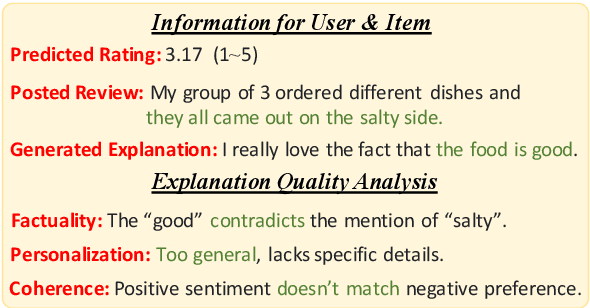

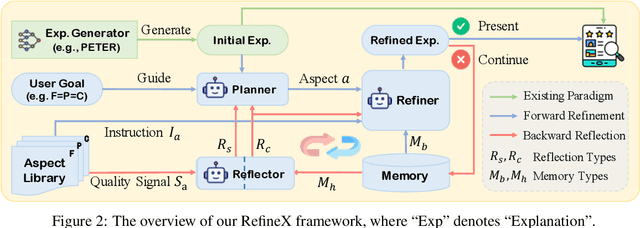

Abstract:Generating natural language explanations for recommendations has become increasingly important in recommender systems. Traditional approaches typically treat user reviews as ground truth for explanations and focus on improving review prediction accuracy by designing various model architectures. However, due to limitations in data scale and model capability, these explanations often fail to meet key user-centric aspects such as factuality, personalization, and sentiment coherence, significantly reducing their overall helpfulness to users. In this paper, we propose a novel paradigm that refines initial explanations generated by existing explainable recommender models during the inference stage to enhance their quality in multiple aspects. Specifically, we introduce a multi-agent collaborative refinement framework based on large language models. To ensure alignment between the refinement process and user demands, we employ a plan-then-refine pattern to perform targeted modifications. To enable continuous improvements, we design a hierarchical reflection mechanism that provides feedback on the refinement process from both strategic and content perspectives. Extensive experiments on three datasets demonstrate the effectiveness of our framework.
A Survey on Large Language Model based Autonomous Agents
Sep 07, 2023Abstract:Autonomous agents have long been a prominent research focus in both academic and industry communities. Previous research in this field often focuses on training agents with limited knowledge within isolated environments, which diverges significantly from human learning processes, and thus makes the agents hard to achieve human-like decisions. Recently, through the acquisition of vast amounts of web knowledge, large language models (LLMs) have demonstrated remarkable potential in achieving human-level intelligence. This has sparked an upsurge in studies investigating LLM-based autonomous agents. In this paper, we present a comprehensive survey of these studies, delivering a systematic review of the field of LLM-based autonomous agents from a holistic perspective. More specifically, we first discuss the construction of LLM-based autonomous agents, for which we propose a unified framework that encompasses a majority of the previous work. Then, we present a comprehensive overview of the diverse applications of LLM-based autonomous agents in the fields of social science, natural science, and engineering. Finally, we delve into the evaluation strategies commonly used for LLM-based autonomous agents. Based on the previous studies, we also present several challenges and future directions in this field. To keep track of this field and continuously update our survey, we maintain a repository of relevant references at https://github.com/Paitesanshi/LLM-Agent-Survey.
RecAgent: A Novel Simulation Paradigm for Recommender Systems
Jun 05, 2023Abstract:Recommender system has deeply revolutionized people's daily life and production, bringing a large amount of business value. In the recommendation domain, simulation and real data-based studies are two typical research paradigms, with each having different advantages. Previously, real data-based studies occupy more important positions, since accurately simulating the user preference is quite difficult. Recently, large language models (LLM) have shown great potential to achieve human-like intelligence, which provides new opportunities to overcome the shortcomings of simulation-based studies and thus highlight their advantages, such as much more application scenarios and cheaper data acquisition strategies. To shed lights on this direction, in this paper, we introduce an LLM-based recommender simulator called RecAgent. Our simulator is composed of two modules: (1) the user module and (2) the recommender module. The user module can browse the recommendation website, communicate with other users and broadcast messages on the social media. The recommender module is designed to provide search or recommendation lists to the users, and one can design different models to implement the recommender. All the users take actions based on LLMs, and can freely evolve like in the real world. We present several case studies to demonstrate that the users in our simulator can indeed behave in a reasonable manner as expected. Our project has been released at https://github.com/RUC-GSAI/YuLan-Rec.
REASONER: An Explainable Recommendation Dataset with Multi-aspect Real User Labeled Ground Truths Towards more Measurable Explainable Recommendation
Mar 01, 2023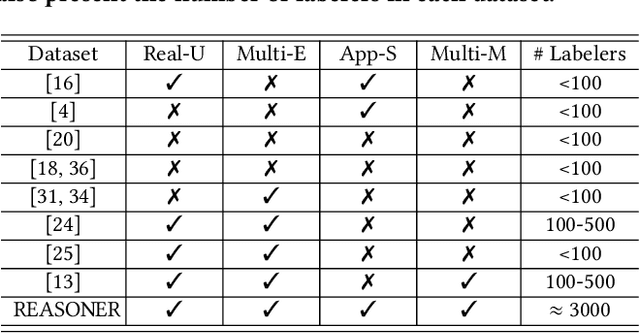
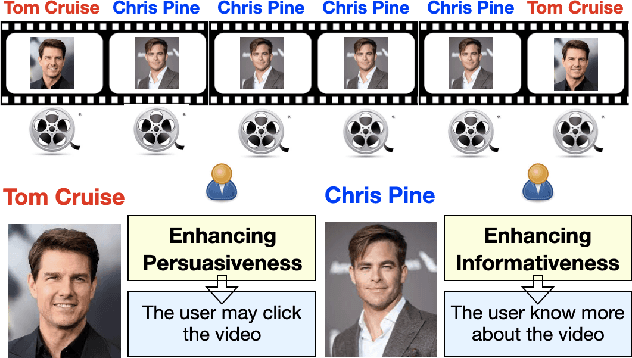


Abstract:Explainable recommendation has attracted much attention from the industry and academic communities. It has shown great potential for improving the recommendation persuasiveness, informativeness and user satisfaction. Despite a lot of promising explainable recommender models have been proposed in the past few years, the evaluation strategies of these models suffer from several limitations. For example, the explanation ground truths are not labeled by real users, the explanations are mostly evaluated based on only one aspect and the evaluation strategies can be hard to unify. To alleviate the above problems, we propose to build an explainable recommendation dataset with multi-aspect real user labeled ground truths. In specific, we firstly develop a video recommendation platform, where a series of questions around the recommendation explainability are carefully designed. Then, we recruit about 3000 users with different backgrounds to use the system, and collect their behaviors and feedback to our questions. In this paper, we detail the construction process of our dataset and also provide extensive analysis on its characteristics. In addition, we develop a library, where ten well-known explainable recommender models are implemented in a unified framework. Based on this library, we build several benchmarks for different explainable recommendation tasks. At last, we present many new opportunities brought by our dataset, which are expected to shed some new lights to the explainable recommendation field. Our dataset, library and the related documents have been released at https://reasoner2023.github.io/.
RecBole 2.0: Towards a More Up-to-Date Recommendation Library
Jun 16, 2022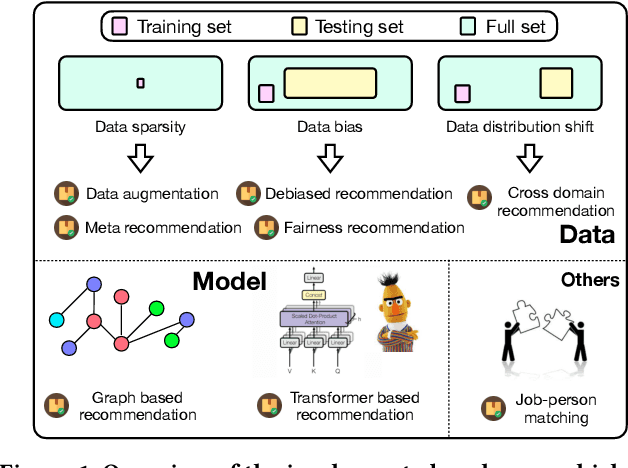
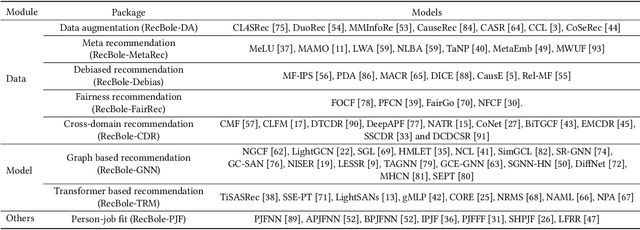
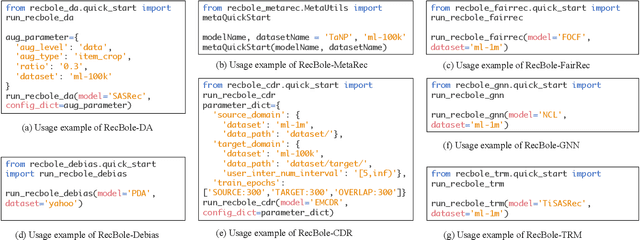
Abstract:In order to support the study of recent advances in recommender systems, this paper presents an extended recommendation library consisting of eight packages for up-to-date topics and architectures. First of all, from a data perspective, we consider three important topics related to data issues (i.e., sparsity, bias and distribution shift), and develop five packages accordingly: meta-learning, data augmentation, debiasing, fairness and cross-domain recommendation. Furthermore, from a model perspective, we develop two benchmarking packages for Transformer-based and graph neural network (GNN)-based models, respectively. All the packages (consisting of 65 new models) are developed based on a popular recommendation framework RecBole, ensuring that both the implementation and interface are unified. For each package, we provide complete implementations from data loading, experimental setup, evaluation and algorithm implementation. This library provides a valuable resource to facilitate the up-to-date research in recommender systems. The project is released at the link: https://github.com/RUCAIBox/RecBole2.0.
 Add to Chrome
Add to Chrome Add to Firefox
Add to Firefox Add to Edge
Add to Edge